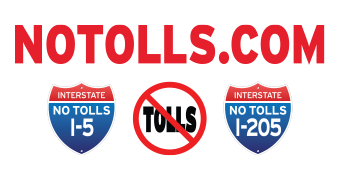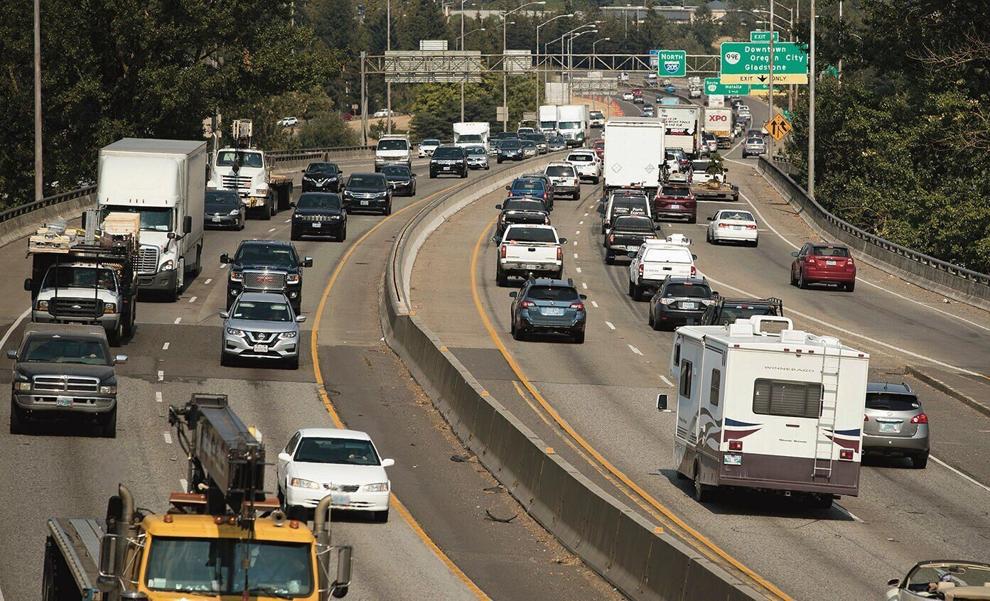Kotek did not rule out a reconsideration of tolling. Interstate Bridge tolling plans to continue
By Corey Buchanan and Raymond Rendleman
The Gresham Outlook — Mar 11, 2024
Gov. Tina Kotek plans to halt the state of Oregon’s plans to toll I-5 and I-205 as a way to pay for transportation infrastructure projects.
In a letter sent to the Oregon Transportation Commission Monday, March 11, Kotek said it’s time for the commission to bring the Regional Mobility Pricing Program to an end — including delaying expenditures for the implementation of tolling on I-205. Kotek did not rule out a reconsideration of tolling, but said the challenges of the program had outweighed the benefits. Concluding the project, she said, would allow the Legislature time to evaluate and provide clearer direction on tolling.
“Taking this action today will allow the state to focus its limited resources on high priority needs and provide an opportunity for meaningful legislative conversations about alternative revenue sources in the 2025 legislative session,” she wrote.
Many residents and representatives within local communities near the freeways — including Lake Oswego, Oregon City, West Linn and Wilsonville — have strongly opposed tolling, saying that it would be too much of a financial burden on commuters while also having unintended consequences like increased traffic on local streets due to diversion. Charbonneau residents, for instance, would have potentially had to pay a toll to travel to inner-Wilsonville for groceries.
The state had initially planned to implement tolling in two phases, first on I-205 as early as 2024 and then I-5 in 2025, and some had pushed for voters to have a say on tolling this November. However, last year, Kotek put a pause on the tolling program until 2026.
The tolling program was intended to pay for the I-5 Rose Quarter Improvement Project, the I-205 Improvement Project — including replacing the Abernethy Bridge near West Linn — and the I-5 Boone Bridge replacement project.
The state already started work on the Abernethy Bridge project and that work will be completed, ODOT Communications Director Kevin Glenn said in an interview, as tolls were identified as a way to repay money for the project. The Legislature will now need to determine an alternative way to do that.
Glenn also noted that the state received $450 million in funding for the Rose Quarter project, but the Legislature would need to identify funding sources to fill a shortfall. There is no alternative funding for the Boone Bridge project available at this time.
“If they identify tolling, we would resume that work. The earliest tolls would begin would probably be sometime in 2027,” Glenn said.
In her letter Kotek referenced a financing plan for transportation projects, which indicated that “rising project costs and uncertainty around future toll revenues meant that the state did not have all the funding needed to proceed with the full strategy as originally envisioned.”
Kotek called on the Legislature to address the “catastrophic funding challenges” the Oregon Department of Transportation faces and acknowledged that this decision would exacerbate such challenges. Lawmakers initially approved tolling as a funding mechanism for transportation projects in 2017.
“The decision to stop the work on the RMPP, and pause development of Oregon’s toll collection program, is not one I come to lightly. I fully appreciate that canceling and delaying alternative funding tools will only make our challenges greater in the near term, but I am confident that a more robust conversation on funding options will yield greater understanding and direction for our future moving forward,” Kotek wrote.
However, Kotek clarified that a pause on tolling shouldn’t impact the Interstate Bridge Replacement Project and said that the state would work with Washington to use the northern state’s tolling infrastructure.
In statements, both Oregon Transportation Commission Chair Julie Brown and Vice Chair Lee Beyer expressed their views that tolling can be a useful funding source.
“While I believe tolling cannot be the only tool to solve all our challenges, as steward of our state’s transportation system, I believe it should be one of our tools. I look forward to our continued conversations throughout the state to identify additional solutions to address our growing challenges and needs,” Brown said.
Though supportive of tolling, Beyer said he came to the view that “the toll program cannot be designed in a way that meets the needs expressed by our local partners while also meeting the needs of Oregonians statewide.”
Oregon City Mayor Denyse McGriff thanked state Rep. Annessa Hartman for fighting hard against tolling alongside cities that would have been impacted by traffic diverting onto side streets to avoid tolls.
“I was more than pleased and glad that the governor was listening when we had our luncheon and I told her how devastating tolling would be for our communities,” McGriff said. “We need to continue to work together, because I still feel ODOT wasn’t listening to us, and that was part of the problem.”
Co-sponsors of anti-tolling legislation Hartman, D-Gladstone/Oregon City, released the following statement with Courtney Neron, D-Wilsonville, and Jules Walters, D-West Linn.
“We are thankful for the governor’s decisive action yesterday. We worked hard to ensure that the voices of those in our communities were heard in public meetings, testimony and advocacy. Our communities did not support shouldering an outsized burden for interstate infrastructure, and this tolling reversal means a lot to those who live and work here.
“We collaborated with regional elected leaders and staff to amplify our constituent’s concerns. The proposals we saw would have placed an inequitable economic impact on the residents and businesses of Clackamas County and parts of Washington County.
“Now, we as legislators will work in 2025 to identify equitable solutions for a safe, modern transportation system, and seek community input every step of the way.”
Regional governmental leaders also praised the governor’s decision to halt tolling, with Metro Council President Lynn Peterson saying, “Now it’s time to come up with new, common-sense ideas for transportation funding that address our modern needs and meet our state and regional climate goals.”
Metro Councilor Christine Lewis added, “I’m thankful that community concerns were taken seriously and our local streets and neighborhoods will not bear the burden of diversion, particularly where we have so few transportation choices. I stand ready and willing to find short- and long-term revenue options that both build our deferred projects and fund our local streets to the standards we need for safety and climate resiliency.”


